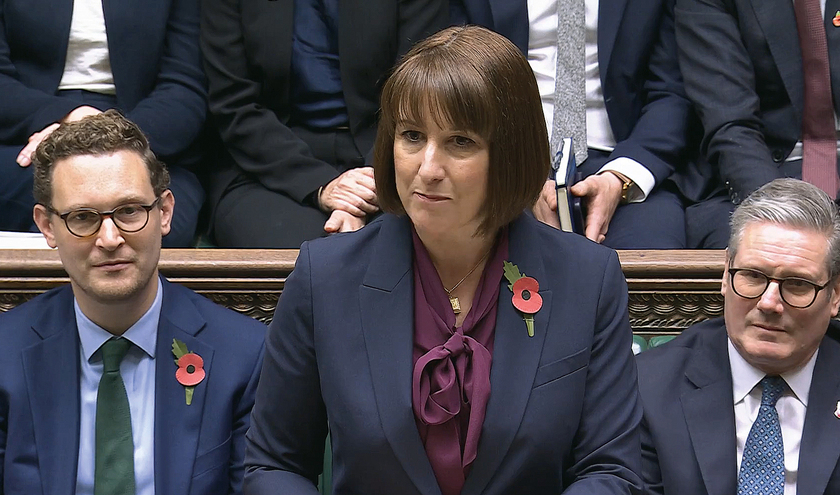Reeves said universal credit would rise to £92 per week for a single person in 2025-26, and to £106 per week by 2029-30. However, the health element for new claimants will be cut by 50% and then frozen, she told the Commons.
In addition, from November 2026, the eligibility criteria for personal independence payments (PIP) will be tightened in England and Wales.
Reeves said: ‘The social security system will always protect those who can never work, that is why this government is proposing an additional premium that will safeguard their incomes. And will end reassessments for people with the most severe, life-long conditions to give them dignity and security.
‘Helping more people into work is a central aim of these reforms and which is why the government is tackling incentives to be inactive by abolishing the WCA, rebalancing Universal Credit, and investing more into employment support.
‘We will always support those with long-term health conditions through the Personal Independence Payment, which will remain an important non-means-tested benefit for disabled people and people with long term health conditions. But these reforms will make the system more targeted and sustainable to ensure the safety net is there for those who need it most.'
The Office for Budget Responsibility has said that they estimate the package will save £4.8bn in the welfare budget, reflecting their judgments on behavioural effects and wider factors.
Analysis by think-tank the Institute for Fiscal Studies predicts the changes will mean that the 2.4 million families who currently receive the health element of Universal Credit will get £280 less a year in 2029/30, while the 4.5 million other families on the benefit will get £150 more a year in 2029/30.
Reaction
However, the announcement has prompted concern. Scotland's finance secretary, Shona Robison, said: ‘Today's statement from the Chancellor will see austerity cuts being imposed on some of the most vulnerable people in our society. The UK Government appears to be trying to balance its books on the backs of disabled people.
‘Not content with these cuts, the UK Government is still expected to short-change Scotland's public services on additional employer National Insurance costs to the tune of hundreds of millions of pounds. This will be felt in public services that people rely on up and down the country - services such as our NHS, GPs, dentists, social care providers, and universities.'
Interim chief executive of NHS Providers, Saffron Cordery, said: ‘The confirmation of cuts to some benefits is a real concern. Mental health trust leaders previously told us that changes to universal credit and benefits were increasing demand for services, as were loneliness, homelessness and wider deprivation.
‘There are particular worries over the potential impact on disabled peoples' health and their ability to support themselves. With poor mental health the leading driver of ill-health related economic inactivity, trust leaders fear these changes could add to pressures on mental and physical health services which are already severely stretched.'
Professor Philip Banfield, BMA council chair, said: 'These welfare policies are short-sighted and counter-productive, with the physical and mental health impacts potentially driving even more people out of work, piling ever more pressure on health services as doctors and their colleagues are left to pick up the pieces.'
RCN general secretary and chief executive Professor Nicola Ranger, said: 'As clinical professionals, nursing staff are clear that the government's health mission and plans to shift from treatment to prevention will be undermined by these cuts.
'Inequality and deprivation are directly linked to poor health. Measures that push vulnerable people into poverty, particularly those with disabilities and long-term conditions, will not only worsen both physical and mental health outcomes but pile more pressure on NHS services, costing more in the long run.'
Dame Clare Moriarty, chief executive of Citizens Advice, added: 'This government says it wants to boost living standards and tackle child poverty, but you can't do that while slashing support for those who need it most. Yes, the benefits system needs fixing but these plans will just make life harder for those already struggling.
'Our data is clear: disabled people already struggle with financial issues more than others. Many people getting disability benefits are also raising children so these cuts will send even more families to food banks.
'We need a benefits system that helps people solve their problems, not create new ones.'
Dame Jennifer Dixon, chief executive of the Health Foundation, said: ‘It is important to support more people to stay in work and reduce economic inactivity through fundamental reforms to improve health.
'Welcome measures in last week's welfare reform green paper aiming to prevent people from being forced to leave employment due to ill health risk being undermined by cuts to benefits that will leave many people worse off, in worse health and less able to return to work.'



